An asylum seeker who pushed a 91-year-old widow down a flight of stairs was at the time on probation for rape and had avoided deportation by Swedish authorities due to “lenient” rules, local media report.
Karam Kanjo, 26, was caught on CCTV at a train station assaulting his elderly victim before ripping gold necklaces from her neck as she walked to her husband’s grave on August 29.
The Syrian national has been found guilty of aggravated robbery and will be deported after Sweden tightened its rules on deporting immigrants convicted of crimes.
Court documents seen by MailOnline show that Kanjo has been booked 19 times by police and has had a series of convictions since arriving in Sweden in 2015, including for robbery and rape, of which he was found guilty in May 2022.
He was sentenced to two years and six months in prison for the sexual attack, but prosecutors did not seek deportation at the time, according to swedish mediaprobably because he had been living in Sweden for six years.
Karam Kanjo, 26, was caught on security cameras at a train station assaulting his elderly victim on August 29. He had previously been convicted of rape and robbery.
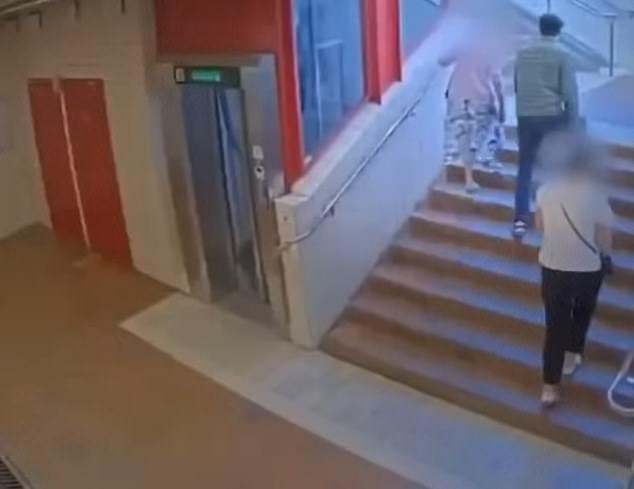
The attack took place at Sollentuna station, around eight miles northwest of Stockholm, and CCTV footage (pictured) captures the shocking incident.
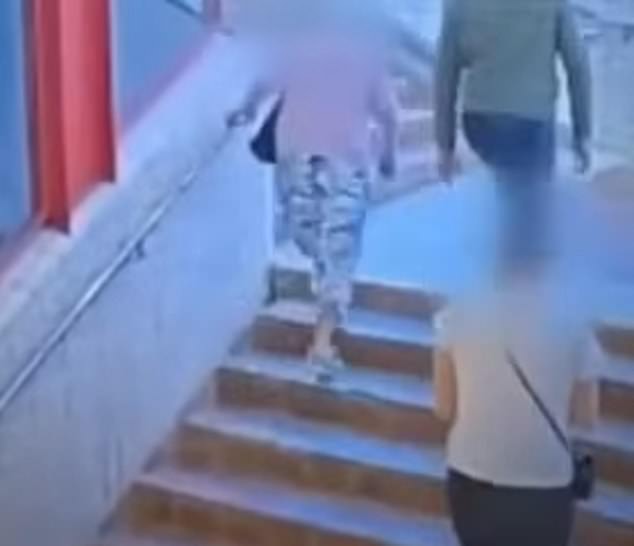
The pair were seen halfway up some stairs at the train station, before the man (top right) grabbed the older women (top left).
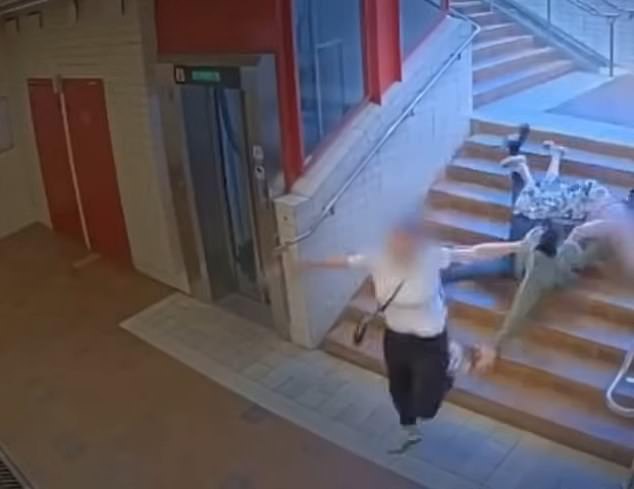
They fell down the stairs together while he tried to remove the necklaces from her neck. A passenger was seen running past as the man dragged the elderly women to the ground.
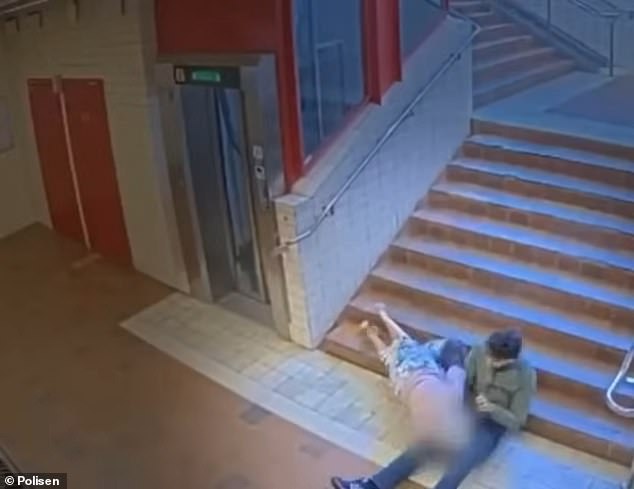
The man and the old woman huddled together at the foot of the stairs. He removed her necklaces after throwing her to the ground.
After serving only half of his sentence, Kanjo was granted parole in October last year. His attack on the elderly widow took place while he was still on parole.
The horrifying video of Kanjo’s attack has shocked Sweden and reignited debate in the country about migration and the effectiveness of the criminal justice system.
He has raised questions about why he was not deported following his rape conviction, with Expressen reporting that the prosecutor “does not remember why he did not demand deportation, but “assumes” he had “a good reason.”
The decision came after a 2019 Supreme Court ruling in a similar case that “extraordinary reasons” would be needed to deport a person who had lived more than four years in Sweden.
Kanjo apparently benefited from this precedent in May 2019, just a few months before the then Minister of Justice tightened the rules, according to Expressen.
Last Monday, Kanjo was sentenced to five and a half years in prison and ordered to be deported back to Syria after being found guilty of aggravated robbery, as well as a violation of Swedish knife laws and a drug crime. .
The court assessed that Kanjo, who has lived in Sweden for almost a decade after entering during Europe’s 2015 migrant crisis, has a “very weak” connection to the country.
His violent crime was caught on camera at Sollentuna station, eight miles northwest of Stockholm, in August, a clip that has served as key evidence in his conviction.
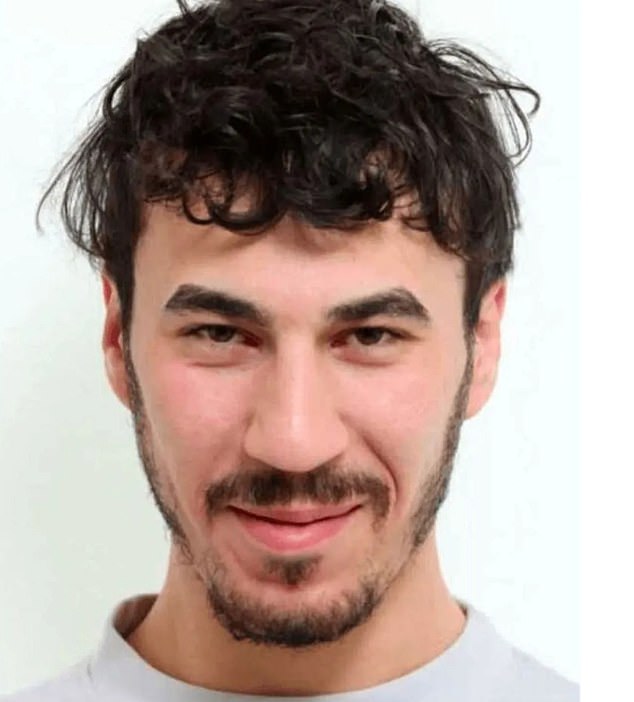
Karam Kanjo (pictured) has been sentenced to five and a half years in prison for the attack.
In it, he is seen holding onto his elderly victim as she walked up the station stairs.
The 91-year-old woman is seen struggling before the pair fall down the stairs as he grabs their necklaces, causing the woman several injuries.
A witness to the attack is seen running to safety, leaving the elderly woman behind.
After the couple reaches the bottom of the stairs, Kanjo gets up and removes the chains, before calmly walking away and leaving the old woman lying on the ground while two female travelers run down the stairs to help her.
According to court documents obtained by MailOnline, the necklaces were gifts she received more than 40 years ago.
When police questioned the victim, she said she was petrified by the episode and had never experienced violence like this in her life.
As well as being deported, Kanjo was ordered to pay his victim 93,100 Swedish crowns (£6,700) in damages.
A judge said Kanjo’s crime was “life-threatening” given his victim’s age. The judge said the elderly woman “suffered swelling to her left hip and arm, bruising to her legs, bruising to her left arm and thick scraped skin around her neck from the necklaces.”
“The swelling appeared and (caused) pain for several weeks.”
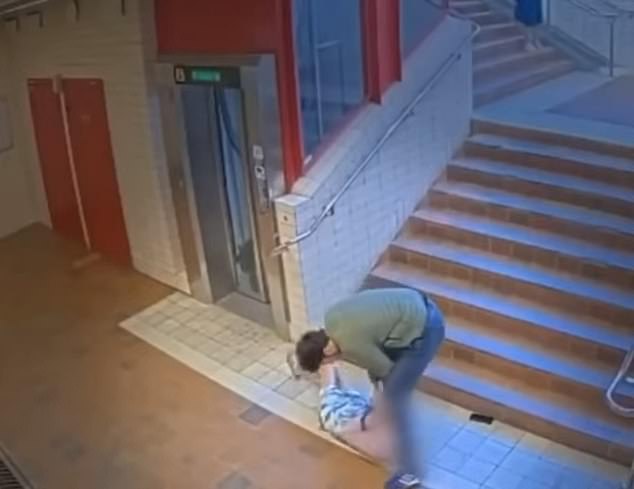
The victim was thrown to the ground and the necklaces were torn from his neck.
‘Even a fall to the ground could have caused serious fractures. Now the fall occurred carelessly down a flight of stairs.
‘It appears to be a fortunate coincidence that (the victim) did not suffer very serious injuries in the fall. Although no legal or similar certificate has been presented in the matter, the court finds that with respect to (the victim’s) age, it is clear that the violence that Karam Kanjo used against her was life-threatening.’
He will also be prohibited from returning to Sweden after being deported, according to court documents.
Although he fought to overturn the deportation order, Swedish authorities told the Attunda district court that his “connection with Sweden is… very weak.”
“According to the Norwegian Prison Service’s investigation, he lives in destructive social conditions, without his own accommodation and is unemployed,” the court was told.
He reportedly told the court that if he was sent home, it would be ‘subjected to torture or inhuman treatment.’
Sweden has had a “net outflow of migrants this year for the first time in decades,” according to Annika Sandlund, UNHCR representative in the Nordic and Baltic countries.
The country’s government, led by the Moderate party and supported by the far-right Sweden Democrats, has increasingly restricted laws regarding asylum seekers.
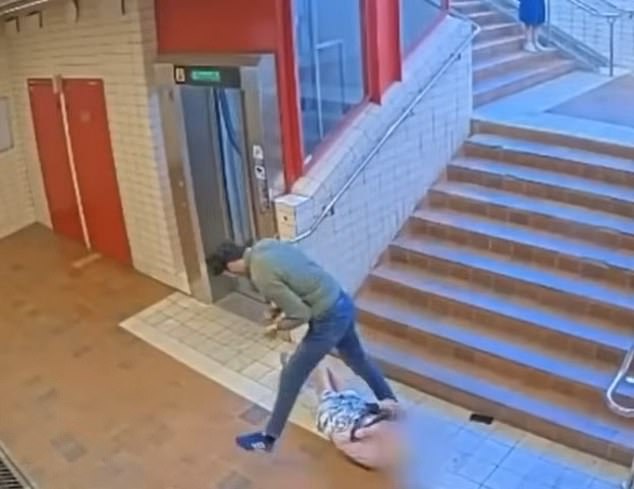
Kanjo was caught on CCTV attacking the elderly widow, who was on her way to visit her husband’s grave.
After years of horrific gang violence, largely blamed on Sweden’s growing migrant population, the center-right government slammed the border and announced a series of tough measures aimed at reducing the number of foreign-born residents, who It currently amounts to more than 20. percent of the total of 10.6 million.
Among the policy proposals is an offer of just under £26,000 for legal immigrants wishing to return voluntarily to their home country; tightening rules on family reunification and asylum; and more than doubling the income threshold for those seeking work visas – from £970 a month to £2,200.
Another such law being pushed by the government is the so-called “snitch law” that would require public sector workers to report illegal immigrants.
In addition to tightening entry restrictions, the government also hopes to encourage thousands of immigrants who have settled here legally to leave voluntarily.
The new Migration Minister, Johan Forssell, recently boasted: “We are in the middle of a paradigm shift in our migration policy.”
Right-wing politician Nima Gholam Ali Pour, an Iranian refugee, told the Mail that “Sweden has had very difficult problems with immigration in recent years.”
‘We have areas where 90 percent are immigrants who do not accept Swedish values and where ethnic Swedes have had to move.
‘Most people don’t want Sweden to look like the Middle East. And why should we receive more immigrants when we cannot integrate those who are already here?
In particular, over the last decade, Sweden’s plans to create a harmonious and pluralistic society have not come to fruition.
The country that once boasted one of Europe’s lowest crime rates is now the continent’s gun crime capital, fueled by violent gangs disproportionately made up of first-generation immigrants who control the illicit drug trade and prostitution in the country.
According to a 2023 police report, there are believed to be 14,000 active gang members in Sweden along with another 48,000 people with “gang affiliation”, many of them as young as nine or ten years old.
During the first six months of this year alone, Sweden suffered a staggering 148 shootings, resulting in 20 deaths. Last year, 55 people were shot and killed in 363 incidents.
In 2022, there were a record 62 fatal shootings, while 73 people between the ages of 15 and 20 were arrested for suspected or attempted murder with a firearm.


